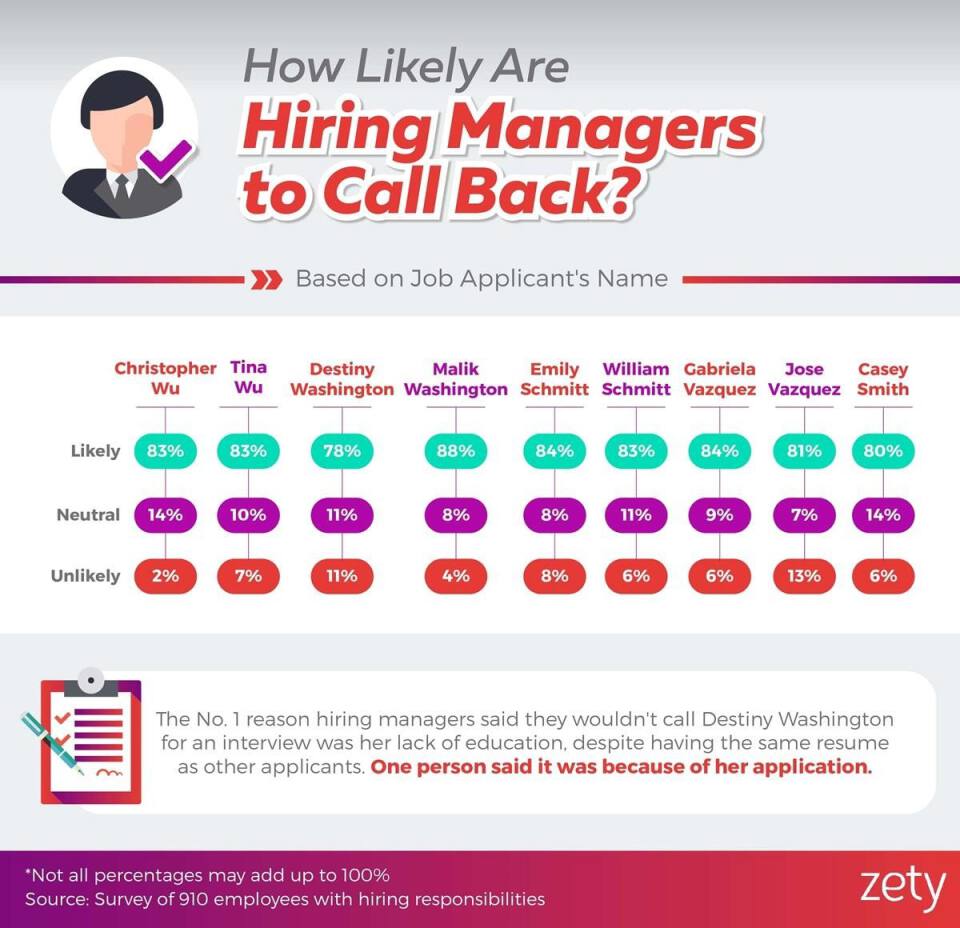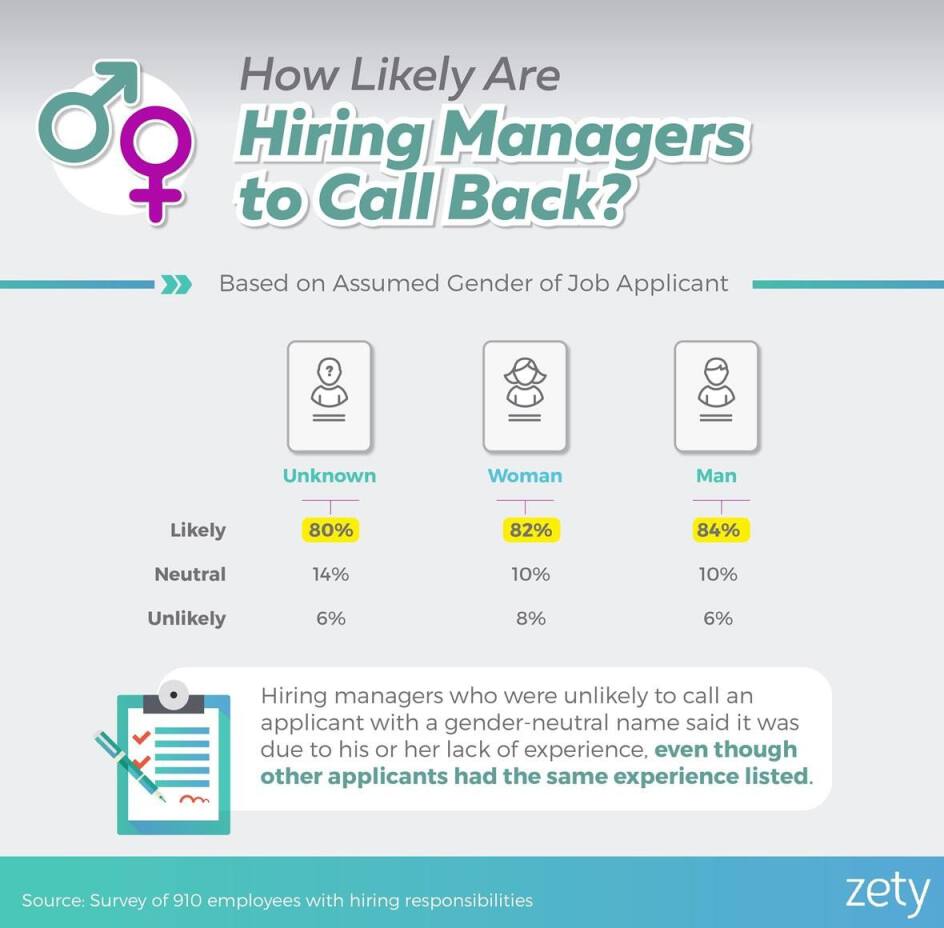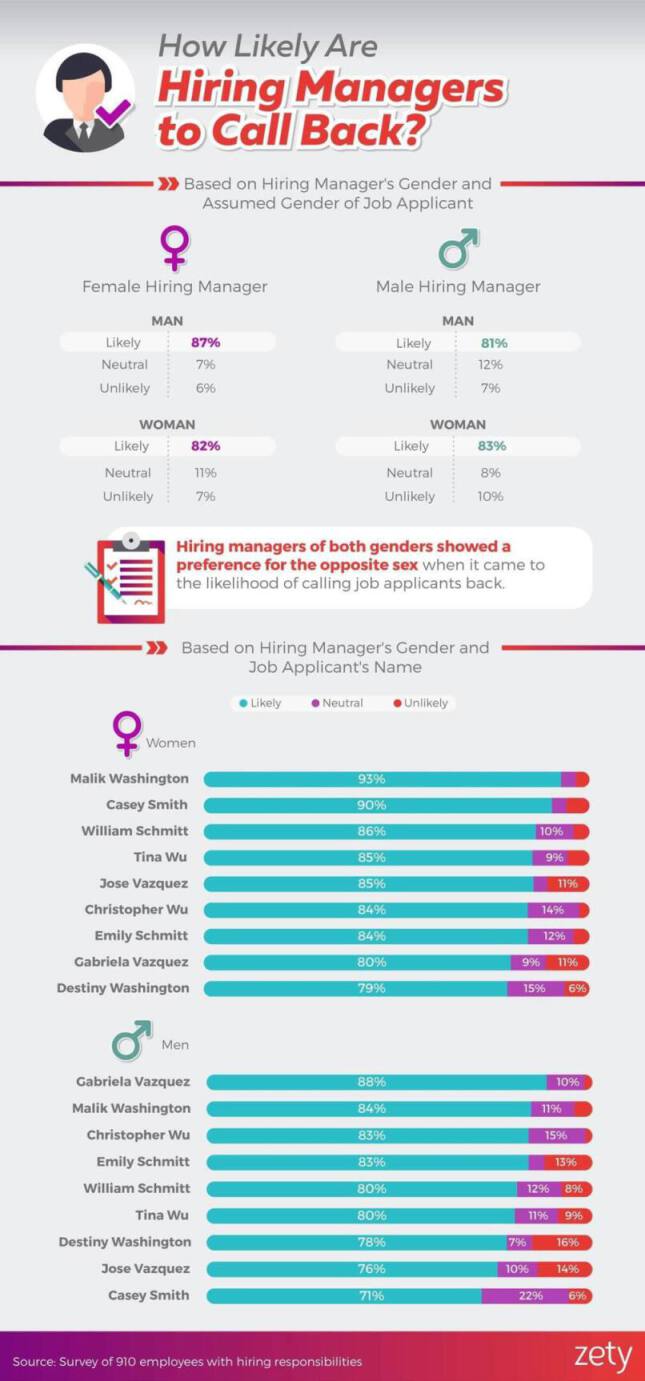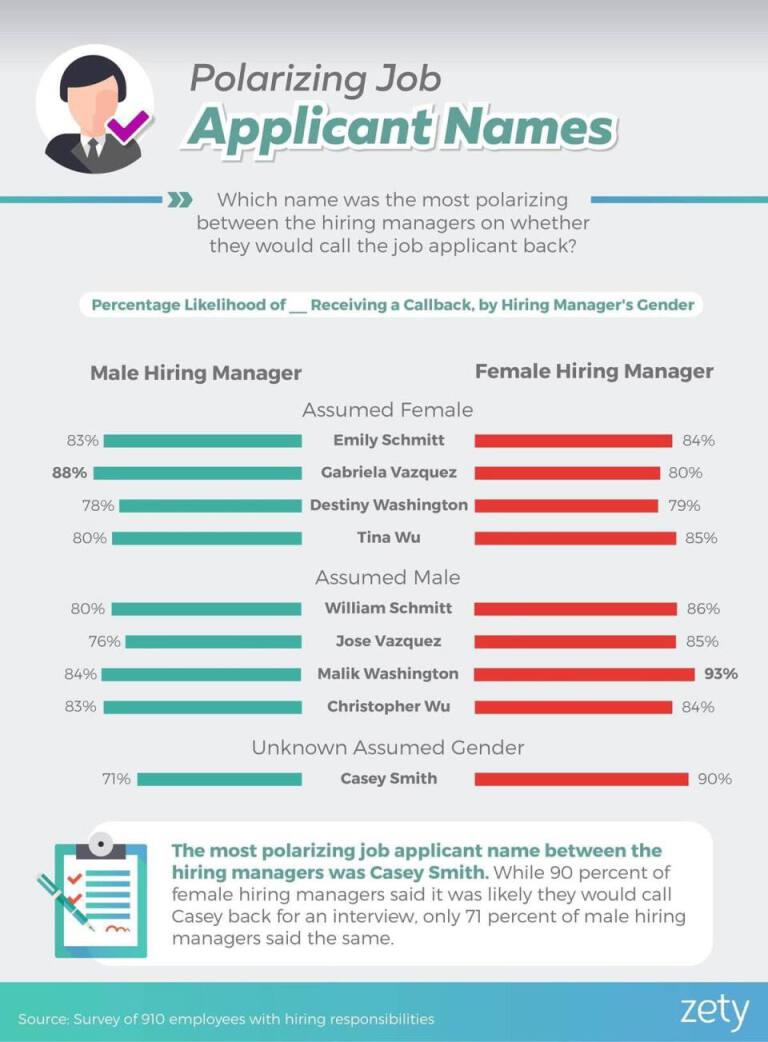
One of the first steps during a job hunt is to submit a resume – with your name at the top in big, bold letters. While your work experience and education are the qualities you hope will stand out, there is still a possibility that hiring managers hold on to some biases and mentally rate candidates based on their names alone.
We surveyed hiring managers to see if there was any gender bias present when they looked over our sample resumes (which were identical in every aspect other than the applicants’ names), so we could pinpoint which applicants were more likely to get an interview. Let’s take a look to see what we found out.
By the Name

First, we checked which names of our theoretical applicants were the likeliest to receive a callback from a hiring manager. Malik Washington had the highest percentage of hiring managers who said they were likely to call for an interview, while Destiny Washington had the lowest percentage. The name with the largest percentage of hiring managers who said they were unlikely to call was Jose Vazquez.
We looked into the reasons Destiny wouldn’t get a callback. The No. 1 reason cited by our respondents was her lack of education, although everyone had the same resume except for the name.
It’s a Matter of Sex

Next, we looked at the gender of the applicants and how that affected their chances of getting a callback from a hiring manager. Our carefully chosen gender-neutral name, Casey Smith, was less likely (80 percent) to merit a call than applicants with female names (82 percent) or male names (84 percent).
Those hiring managers who didn’t think Casey deserved a callback said it was because the applicant lacked experience. Again, all our resumes had the same information – it was just the names that differed.
Does a Callback Depend on the Manager’s Gender?

Next, we analyzed the data to see if hiring managers’ gender factored into the decision to call an applicant or toss their resume aside. Hiring managers seemed to prefer the opposite sex when making hiring decisions. In other words, men were slightly more likely to call female applicants, and women were somewhat more likely to call male applicants.
When we broke it down by name, there was more of a disparity in some cases, but for some applicants, it was pretty close for male and female hiring managers. For example, women were far more likely to call Malik Washington (93 percent) than men (84 percent), while both were equally likely to call Destiny Washington (79 percent of and 78 percent of men would call her back).
Gender Differences

There were a few names that really stood out as differences among hiring managers. The most polarizing name in our job applicant pool was the gender-neutral Casey Smith. Ninety percent of female hiring managers stated they were likely to call him or her for an interview, but only 71 percent of men said the same.
Some percentages were a lot closer than that, however. Seventy-eight percent of men and 79 percent of women would be likely to give Destiny a call. Eighty-three percent of male hiring managers and 84 percent of female hiring managers said they’d likely give Emily Schmitt a call.
What’s in a Name?
As much as we’d like to think that our professional experience, education, and skill set are what pop out to hiring managers, our survey reveals this doesn’t always happen. It was a little shocking to have some of our respondents say outright that they would not consider an applicant, and it was also insightful to see the biases that were present when our respondents viewed the same resumes, with the only difference being the name at the top of the document. While many people are taking strides to eliminate gender biases, it may be true that some are so ingrained people may not realize they carry these presumptions until they’re highlighted.
Methodology and Limitations
We collected responses from 910 participants from Amazon’s Mechanical Turk. Only respondents who said one of their responsibilities at their job in the past year included hiring were allowed to take the survey. Eighty-one percent of these employees involved in hiring were white or Caucasian, 7 percent said they were black or African-American, 6 percent said they were Hispanic, and 6 percent said they were Asian or Asian-American. Fifty-three percent were men, and 47 percent were women.
The first names of the fictitious job applicants were based on the most popular names in Georgia’s Online Analytical Statistical Information System (OASIS) in 1997. The gender-neutral name was chosen based on the BabyNames1000.com listing for the most popular gender-neutral names from 1997. Last names came from the Demographic Aspects of Surnames From Census 2000 on Table 2.
The survey shown to each hiring manager was done through random assignment. Every resume had an 11.12 percent chance of being shown to a hiring manager. Because it was random, resumes were not shown the same number of times. The breakdown was:
- Malik Washington
- Men: 62
- Women: 55
- White or Caucasian: 95
- Asian or Asian-American: 10
- Black or African-American: 7
- Hispanic: 5
- Total number of hiring managers: 117
- Hiring managers’ gender breakdown:
- Hiring managers’ race/ethnicity breakdown:
- Casey Smith
- Men: 63
- Women: 51
- White or Caucasian: 84
- Asian or Asian-American: 9
- Black or African American: 11
- Hispanic: 7
- Multiracial or Biracial: 3
- Total number of hiring managers: 114
- Hiring managers’ gender breakdown:
- Hiring managers’ race/ethnicity breakdown:
- Jose Vazquez
- Men: 49
- Women: 55
- White or Caucasian: 77
- Asian or Asian-American: 6
- Black or African American: 8
- Hispanic: 10
- Multiracial or Biracial: 3
- Total number of hiring managers: 104
- Hiring managers’ gender breakdown:
- Hiring managers’ race/ethnicity breakdown:
- William Schmitt
- Men: 51
- Women: 50
- White or Caucasian: 76
- Asian or Asian-American: 10
- Black or African American: 9
- Hispanic: 3
- Multiracial or Biracial: 2
- American Indian or Alaskan Native: 1
- Total number of hiring managers: 101
- Hiring managers’ gender breakdown:
- Hiring managers’ race/ethnicity breakdown:
- Gabriela Vazquez
- Men: 51
- Women: 44
- White or Caucasian: 66
- Asian or Asian-American: 8
- Black or African American: 8
- Hispanic: 6
- Multiracial or Biracial: 7
- Total number of hiring managers: 95
- Hiring managers’ gender breakdown:
- Hiring managers’ race/ethnicity breakdown:
- Emily Schmitt
- Men: 48
- Women: 50
- White or Caucasian: 78
- Asian or Asian-American: 10
- Black or African American: 6
- Hispanic: 2
- Multiracial or Biracial: 1
- Native Hawaiian or Pacific Islander: 1
- Total number of hiring managers: 98
- Hiring managers’ gender breakdown:
- Hiring managers’ race/ethnicity breakdown:
- Tina Wu
- Men: 45
- Women: 54
- White or Caucasian: 78
- Asian or Asian-American: 7
- Black or African American: 5
- Hispanic: 8
- Multiracial or Biracial: 1
- Total number of hiring managers: 99
- Hiring managers’ gender breakdown:
- Hiring managers’ race/ethnicity breakdown:
- Destiny Washington
- Men: 47
- Women: 45
- White or Caucasian: 62
- Asian or Asian-American: 12
- Black or African American: 8
- Hispanic: 7
- Multiracial or Biracial: 2
- American Indian or Alaskan Native: 1
- Total number of hiring managers: 92
- Hiring managers’ gender breakdown:
- Hiring managers’ race/ethnicity breakdown:
- Christopher Wu
- Men: 53
- Women: 37
- White or Caucasian: 78
- Asian or Asian-American: 2
- Black or African American: 2
- Hispanic: 6
- Multiracial or Biracial: 2
- Total number of hiring managers: 90
- Hiring managers’ gender breakdown:
- Hiring managers’ race/ethnicity breakdown:
Each person with hiring responsibilities saw one resume. They were presented with a job listing for which the applicant was applying.
Every resume was nearly identical apart from each applicant’s name and email address, which only differed by the name of the job applicant.
Because there was no set quota for how many hiring managers from each race or ethnicity would see each of the resumes, one resume may have been reviewed by more people than others. For example, eight Asian or Asian-American hiring managers saw Gabriela Vazquez’s resume, but 12 saw Destiny Washington’s. Because the resume that each hiring manager saw was random, the total number of reviews each resume received varied.
Fair Use Statement
Shocked to see bias in hiring managers’ decision-making in 2021? We are too. Perhaps making others aware of the problem will put us on the right track. Continue the dialogue with your readers by sharing this article with them, as long as it’s for noncommercial purposes. Please remember to link back to this page so that they can view the full breadth of our research.
About Us
Zety unravels the secrets of resume writing, such as job-winning formulas for resume summaries and the key skills for any job. Our experts help job seekers apply for their dream professions using guidance on the best resume formats and professional resume templates.
About Zety’s Editorial Process
This article has been reviewed by our editorial team to make sure it follows Zety's editorial guidelines. We’re committed to sharing our expertise and giving you trustworthy career advice tailored to your needs. High-quality content is what brings over 40 million readers to our site every year. But we don't stop there. Our team conducts original research to understand the job market better, and we pride ourselves on being quoted by top universities and prime media outlets from around the world.


![Resume Bias: Gender, Names, Ethnicity [2021 Study]](https://cdn-images.zety.com/pages/resume-bias-ztus-cta-02.webp)